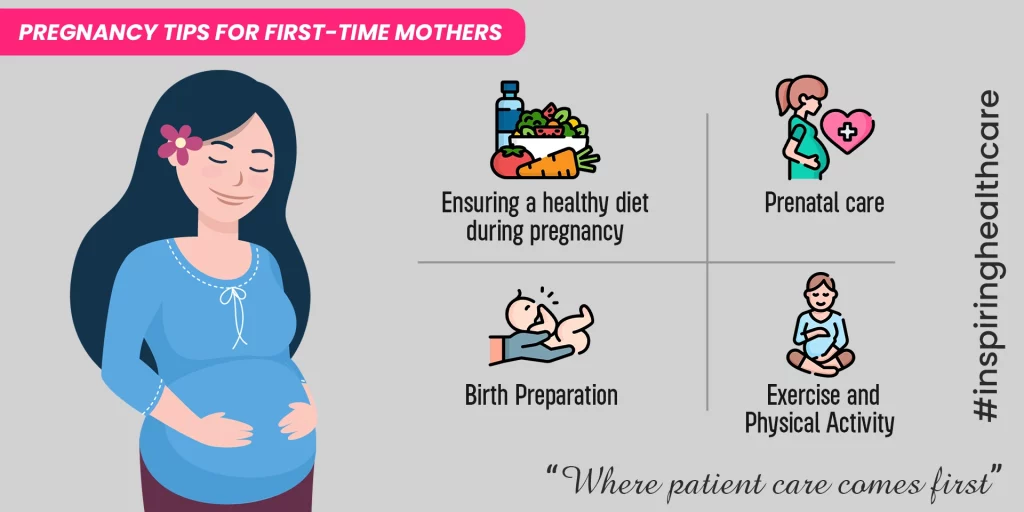This journey is an exciting and life-changing experience, especially if it’s your first time expecting a baby. As an expecting mother, it’s essential to arm yourself with valuable knowledge and guidance to navigate through this beautiful yet sometimes challenging phase of life. In this blog, we’ll explore essential Pregnancy Tips for First-Time Mothers, providing straightforward advice and expert insights to help you enjoy a healthy and fulfilling pregnancy journey.
Book an Appointment with Dr. S. Sharma for Pregnancy and Gynecology related issues.
Understanding Pregnancy
Understanding Pregnancy entails grasping the physical, emotional, and psychological transformations that occur during this transformative period.
A. Physical Changes in the Body:
During pregnancy, the body undergoes significant physical alterations driven by hormonal fluctuations and fetal development. These changes encompass weight gain, increase in breast size, backaches, and leg cramps. Additionally, expectant mothers may encounter discomfort in their abdomen, hips, and legs as their bodies accommodate the growing fetus.
B. Emotional and Psychological Changes:
Pregnancy commonly triggers emotional and psychological shifts, largely influenced by hormonal variations and the inherent stress of pregnancy. Mood swings, heightened sensitivity, and negative emotions such as low mood, fear, anxiety, ambivalence, conflict, and regression are typical occurrences. While these changes are transient and natural, pregnant individuals must monitor their mental well-being and seek assistance if necessary.
C. Common Pregnancy Symptoms and Their Management:
Pregnancy often brings forth a range of symptoms including nausea, vomiting (morning sickness), fatigue, heartburn, and constipation. These symptoms can be alleviated through dietary adjustments, adequate rest, and the judicious use of over-the-counter medications. However, pregnant individuals should always consult with their healthcare provider before taking any medication or supplements to ensure safety for both mother and baby.
Also Read: Gynecological Self-Care Tips for Newlywed Women
Pregnancy Tips for First-Time Mothers

Nutrition and Diet during Pregnancy
Ensuring a healthy diet during pregnancy is essential for both the mother’s and the baby’s well-being. Here are some key points to consider regarding nutrition and diet for Pregnancy Tips for First-Time Mothers:
A. Emphasize Balanced Eating:
- Prioritize a well-rounded diet including fruits, vegetables, whole grains, lean protein, and healthy fats.
- Opt for nutrient-rich foods to meet the increased demands of pregnancy.
- Keep sweets and fats intake in check while ensuring adequate nutrient consumption.
B. Vital Nutrients for Mom and Baby:
- Key nutrients during pregnancy encompass multivitamins, iron, and calcium.
- These nutrients are pivotal for the baby’s development and support the mother’s health during pregnancy.
C. Foods to Avoid
- Pregnant women should steer clear of certain foods such as raw or undercooked meat, unpasteurized dairy products, raw eggs, raw fish, and caffeine.
- It’s advisable to abstain from alcohol and moderate intake of sugary and fatty foods for a healthy pregnancy.
Prenatal Care
Prenatal care is crucial for ensuring a healthy pregnancy and the well-being of both the mother and the baby. Here are key points to consider:
A. Importance of Regular Checkups:
- Regular checkups during pregnancy are vital for monitoring the health of the mother and growth of the baby.
- Early and consistent prenatal care enhances the likelihood of a healthy pregnancy.
- These checkups enable healthcare providers to detect and address any potential issues at an early stage.
B. Choosing the Right Healthcare Provider:
- Opt for a healthcare provider specializing in obstetrics.
- Prioritize selecting a provider based on their experience, credentials, and reputation.
- Consider factors like location, convenience, and availability when making your decision.
C. Understanding Prenatal Tests and Screenings:
- Prenatal tests and screenings aim to identify potential health concerns in both the mother and the baby.
- Common tests include blood tests and ultrasounds.
- Understanding these procedures is essential for making informed decisions about pregnancy care.
Trust Your Doctor, Not the Internet: Although the Internet offers a whole lot of information about pregnancy, googling your doubts and concerns may be misleading and usually results in unnecessary anxiety and fear. It is safe and best to raise your concerns and doubts to your doctor rather than trusting the Internet.
Also Read: The Role of Proper Hygiene in Preventing UTIs (Urinary Tract Infections)
Exercise and Physical Activity
Light Exercise during pregnancy brings a host of benefits for both mom and baby. Let’s delve into these advantages, explore safe workout options, and highlight essential precautions for Pregnancy Tips for First-Time Mothers:
A. Benefits of Exercising During Pregnancy: Regular physical activity boosts stamina, heart health, and mood while reducing the risk of complications. It also tackles common discomforts like back pain and constipation and lowers the chances of gestational diabetes.
B. Safe Workout Choices for Expectant Moms: Recommended exercises include walking, swimming, cycling, and yoga. These activities build muscle strength, support the body’s extra weight during pregnancy, and enhance joint flexibility and overall fitness.
C. Precautions and Tips for Exercising During Pregnancy: Before starting any exercise regimen, pregnant women must consult their healthcare provider. Listen to your body’s signals, ensure proper hydration. After the first trimester, steer clear of exercises that involve lying flat on your back. Also, avoid high-risk activities like those with a risk of falling or abdominal injury, and be cautious with balance or coordination exercises.
Birth Preparation
Preparing for childbirth involves understanding the stages of labor, creating a birth plan, and getting ready for the arrival of your baby. Here are key points to consider:
A. Understanding the Stages of Labor:
- Labor consists of three main stages:
- Early stage: Contractions begin, and the cervix begins to dilate.
- Active stage: Contractions intensify, and the cervix continues to dilate.
- Transition stage: The cervix fully dilates in preparation for delivery.
- The second stage involves pushing and delivering the baby, while the third stage focuses on delivering the placenta.
- Familiarize yourself with these stages to better prepare for labor and delivery.
B. Creating a Birth Plan:
- A birth plan outlines your preferences for labor, delivery, and postpartum care.
- It can include preferences for pain management, who will be present during labor, positions for labor and delivery, and other aspects of your childbirth experience.
- Discuss your birth plan with your healthcare provider to ensure that your preferences are considered during labor and delivery.
C. Preparing for the Arrival of Your Baby:
- Getting ready for your baby’s arrival involves setting up a nursery, purchasing essential baby items like clothing and diapers, and preparing emotionally for parenthood.
- It’s important to have a support system in place, attend prenatal classes, and make arrangements for childcare if needed.
- Understanding what to expect during labor and delivery can help alleviate anxiety and better prepare you for the arrival of your baby.
Also Read: The Dos and Don’ts of Intimate Hygiene: A Guide for Gen Z Women
Managing Discomfort and Challenges
Pregnancy often brings discomfort and challenges for women. Here are effective strategies to manage morning sickness, fatigue, sleep issues, and common pregnancy pains:
A. Managing Morning Sickness: Morning sickness, marked by nausea and vomiting, is typical in early pregnancy. To alleviate it, try eating small, frequent meals, staying hydrated, avoiding strong odors, and getting ample rest.
B. Coping with Fatigue and Sleep Problems: Fatigue and sleep disturbances arise due to hormonal shifts and physical discomfort. Combat them by sticking to a regular sleep schedule, practicing relaxation techniques before bed, using supportive pillows, and engaging in light daytime exercise.
C. Alleviating Common Pregnancy Pains: Pregnancy often brings various pains like backaches, leg cramps, and abdominal discomfort. Ease these with good posture, using heat or cold packs, gentle exercises such as prenatal yoga or swimming, and consulting your healthcare provider for safe pain relief options.
Things to Know as a First-time Mom
Understanding Changes in Sex Drive: Expect fluctuations in sex hormones throughout pregnancy. Interest may wane in the first trimester due to nausea and fatigue, but typically rises in the second trimester before declining again in the third.
Early Lactation: Leaking breast milk before birth is normal as your body prepares for breastfeeding. Early lactation can begin as early as 16 weeks into pregnancy.
Managing Fatigue: Fatigue is common but varies by trimester. While energy levels may increase in the second trimester, exhaustion often returns in the third. Consult your doctor if fatigue becomes extreme, as it could signal underlying medical conditions.
Preparing for Birth: Discuss the birthing process and stages of labor with your doctor. Learn about signs of labor and when to go to the hospital. Understanding labor helps prepare for childbirth.
Coping with Pregnancy Discomfort: Utilize these tips to manage everyday discomforts during pregnancy and enjoy the journey to motherhood.
FAQS
- What can first-time moms anticipate during pregnancy?
- Pregnancy symptoms vary among individuals but may include nausea, breast tenderness, fatigue, mood swings, and anxiety.
- What should first-time pregnant women be informed about?
- Understanding common pregnancy symptoms and potential complications, familiarizing themselves with birthing processes, and recognizing the importance of prenatal vitamins.
- How can I promote a healthy pregnancy as a first-time mom?
- Prioritize lifestyle adjustments like staying hydrated, maintaining a balanced diet, engaging in physical activity, and ensuring adequate rest.

